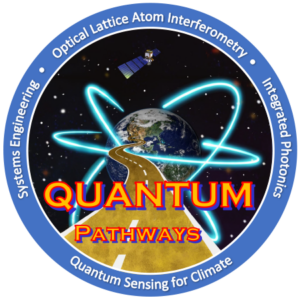Quantum Pathways Institute
Atom interferometry and related Quantum Sensing techniques are well established in laboratory experiments, and deployed in certain terrestrial, marine, or airborne applications. Quantum sensing in spaceflight presents fundamentally different challenges and opportunities for advancement of climate science and PNT. Research activity in spaceborne quantum sensing at CSR includes:
 The Quantum Pathways Institute is a NASA/STMD sponsored Space Technology Research Institute, whose goal is to advance next generation climate science using quantum advantage for measurement of mass change from space, at unprecedented precision and resolutions. We target systems-level advancement to TRL3+ for quantum gradiometer concepts based on femto-meter/s^2 inertial sensing. We move forward on three research objectives: atomic physics, aerospace systems engineering for quantum sensors, and photonics for spaceflight, in preparation for spaceflight readiness. Led by the PI Bettadpur at the UT Center for Space Research, the collaborating team includes scientists from MRC and the Oden Institute at UT Austin; JILA, CCAR, and ECE at CU Boulder; GALCIT at Caltech; and the OCAQPI at UC Santa Barbara.
The Quantum Pathways Institute is a NASA/STMD sponsored Space Technology Research Institute, whose goal is to advance next generation climate science using quantum advantage for measurement of mass change from space, at unprecedented precision and resolutions. We target systems-level advancement to TRL3+ for quantum gradiometer concepts based on femto-meter/s^2 inertial sensing. We move forward on three research objectives: atomic physics, aerospace systems engineering for quantum sensors, and photonics for spaceflight, in preparation for spaceflight readiness. Led by the PI Bettadpur at the UT Center for Space Research, the collaborating team includes scientists from MRC and the Oden Institute at UT Austin; JILA, CCAR, and ECE at CU Boulder; GALCIT at Caltech; and the OCAQPI at UC Santa Barbara.
The QGG Pathfinder Study (PI Bettadpur) is funded through a NASA Earth Science Instrument Incubator Program (IIP21) grant, in collaboration with Caltech/Jet Propulsion Laboratory, where we undertake the development of science applications and space mission architectures for gravity field measurement using “conventional” cold atom interferometer techniques.
Please visit this space for future updates on results of our efforts to grow quantum sensing applications to remote sensing and aerospace PNT applications.